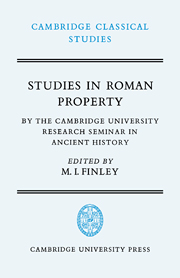Book contents
- Frontmatter
- Contents
- Preface
- 1 INTRODUCTION
- 2 SOME CONFIGURATIONS OF LANDHOLDING IN THE ROMAN EMPIRE
- 3 IMPERIAL ESTATES
- 4 CLASSICAL ROMAN LAW AND THE SALE OF LAND
- 5 THE CICERONIAN ARISTOCRACY AND ITS PROPERTIES
- 6 PRIVATE FARM TENANCY IN ITALY BEFORE DIOCLETIAN
- 7 URBAN PROPERTY INVESTMENT
- 8 AGRI DESERTI
- Notes
- Bibliography
- Index
4 - CLASSICAL ROMAN LAW AND THE SALE OF LAND
Published online by Cambridge University Press: 05 June 2014
- Frontmatter
- Contents
- Preface
- 1 INTRODUCTION
- 2 SOME CONFIGURATIONS OF LANDHOLDING IN THE ROMAN EMPIRE
- 3 IMPERIAL ESTATES
- 4 CLASSICAL ROMAN LAW AND THE SALE OF LAND
- 5 THE CICERONIAN ARISTOCRACY AND ITS PROPERTIES
- 6 PRIVATE FARM TENANCY IN ITALY BEFORE DIOCLETIAN
- 7 URBAN PROPERTY INVESTMENT
- 8 AGRI DESERTI
- Notes
- Bibliography
- Index
Summary
To limit disappointment the reader is asked to bear in mind the genesis of the contents of this chapter. The task set by the seminar was, in the context of discussions about the movement of land (or dispersal of land, or the ‘market in land’), to see whether anything in the classical Roman legal sources had any socio-economic interest or bearing on those discussions. What follows is the carrying out of that task. It therefore has no particular thesis or structure; whether it has much or any interest or bearing of the kind sought, the reader must decide. It is also sternly confined to the subject in hand: it is about classical Roman law and the sale of land. It does not deal with rules of conveyance except as related to sale, and it does not deal with rules of sale except as related to land. There is a rough division into two parts. Part I examines some sets of legal rules related to the sale of land: Part II examines the principal Titles about sale in the Digest and the Code, to see what part land plays in them.
The first rule worth a mention is one to whose economic significance attention was drawn long ago by Jonkers. It was a legal obligation upon guardians not to leave any spare capital of their wards unproductive: they had to do with it one of two things – either faenus exercere or fundos comparare.
- Type
- Chapter
- Information
- Studies in Roman PropertyBy the Cambridge University Research Seminar in Ancient History, pp. 71 - 84Publisher: Cambridge University PressPrint publication year: 1976
- 1
- Cited by



